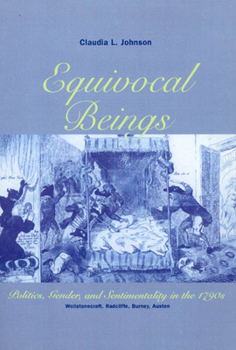Equivocal Beings: Politics, Gender, and Sentimentality in the 1790s--Wollstonecraft, Radcliffe, Burney, Austen
(Part of the Women in Culture and Society Series)
In the wake of the French Revolution, Edmund Burke argued that civil order depended upon nurturing the sensibility of men-upon the masculine cultivation of traditionally feminine qualities such as sentiment, tenderness, veneration, awe, gratitude, and even prejudice. Writers as diverse as Sterne, Goldsmith, Burke, and Rousseau were politically motivated to represent authority figures as men of feeling, but denied women comparable authority by representing their feelings as inferior, pathological, or criminal. Focusing on Mary Wollstonecraft, Ann Radcliffe, Frances Burney, and Jane Austen, whose popular works culminate and assail this tradition, Claudia L. Johnson examines the legacy male sentimentality left for women of various political persuasions. Demonstrating the interrelationships among politics, gender, and feeling in the fiction of this period, Johnson provides detailed readings of Wollstonecraft, Radcliffe, and Burney, and treats the qualities that were once thought to mar their work-grotesqueness, strain, and excess-as indices of ideological conflict and as strategies of representation during a period of profound political conflict. She maintains that the reactionary reassertion of male sentimentality as a political duty displaced customary gender roles, rendering women, in Wollstonecraft's words, "equivocal beings."
Format:Paperback
Language:English
ISBN:0226401847
ISBN13:9780226401843
Release Date:June 1995
Publisher:University of Chicago Press
Length:256 Pages
Weight:0.86 lbs.
Dimensions:0.6" x 6.1" x 9.0"
Customer Reviews
0 rating





